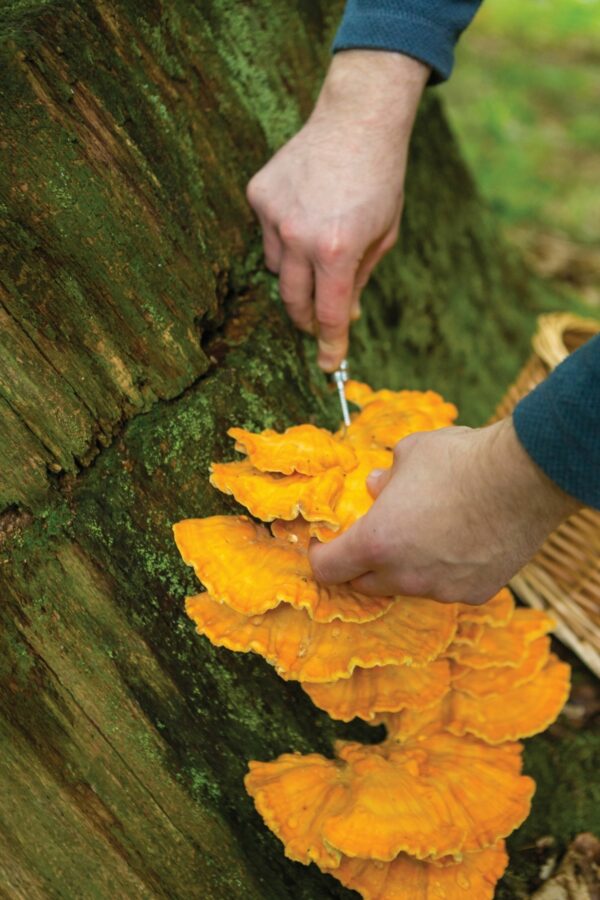If You Go Down To The Woods
Food writer, Genevieve Verdigel reclaims foraging from the hipsters to new-agers

By Genevieve Verdigel
October 17 2024
Last weekend, I dropped into my local farm shop in Kent to pick up some provisions — eggs, sourdough bread, bacon — the usual stuff. On walking in, the first thing that caught my eye were neat little bags of ‘hand-foraged wild garlic’ selling for £3 a pop. My f irst thought was not “Oh, that will make a lovely pesto”, but more “Damn, why didn’t I think of that first?” and, third, “What on earth does hand-foraged even mean? How else are you meant to pick the stuff? With your teeth?” Buying wild garlic rather defeats the object. Foraging is all about venturing out into the unknown and getting down on your hands and knees — and possibly stung and scratched — to return home feeling at one with Nature. Isn’t it? Now, I have made use of Nature’s (free) bounty. Alongside the wild garlic in my garden that seems to multiply every time I pick a sprig, I stuff my face with countless blackberries on early-autumn walks, and should I really want to make nettle soup then there is ample opportunity to harvest some (as long as it’s well away from the footpath the dogwalkers take). But I would never claim to be into foraging. Yes, I pick blackberries, but please do not call me a forager.

It’s a term that bobs with those other New Age culinary terms: fermenting and pickling. New Age in that the words suggest quasi-mystical endeavour that will put you in contact with the universe and, perhaps most importantly, is presented as a religion that resurrects ancient wisdom. For foraging is nothing new. It is simply a means to find food that has been used since time began and can be witnessed every day when the resident blue tit drops into your garden to collect a worm. Which brings me to the unofficial god of the foraging religion: René Redzepi. His church, Noma in Copenhagen — which closed in 2023 — was the locus from where this belief system disseminated. Since its opening in 2003, many made the pilgrimage to worship at the altar or, rather, to eat the likes of nuts, leaves, and ants (the latter alive, of course). And such was the power of this Messiah, that soon disciples across the globe had set up their own churches to preach this gospel. Magnus Nilsson at Fäviken, Alex Atala at DOM, Doug McMaster at Silo, Dan Barber at Blue Hill… to mention just a few. All incorporate ingredients such as sea buckthorn, dandelion, and lovage, and singing from the heavens about the fact that it is foraged. Do we really need to know that someone spent three hours rummaging around in the undergrowth for the morels served with the wild duck breast? Or that they went out that morning to gather the junipers that the venison was cooked with?
Yes, if you preach seasonality then to forage is to harness, acutely, the vicissitudes of the seasons. And we live among the likes of Valentine Warner. I often encounter this bold and GETTY original chef at London restaurant shenanigans. And when I see him, he invariably looks like he would rather be standing knee-deep in water with a fishing rod in hand, or stalking the riverbank for cobnuts. But while he lives and breathes this lifestyle, upstart chefs who have once read about Noma in The Caterer magazine should realise that adding a token sprig of stolen borage to their chimichurri, and yelling about it on the menu, will not cut the mustard.
But worse is that the foraging obsession has trickled down from chefs singing its praises to the middle classes. Now everyone is at it. There are apps on how to identify mushrooms so that you don’t poison everyone who comes over for supper. But new foragers — foragistes, perhaps (not to be confused with Faragistes, which is a whole other, and perhaps rather more fun, ball game) take heed: you are not Bear Grylls. You live in Primrose Hill and you really are not going to be making a foraged meal from whatever you have found on Hampstead Heath. Without sounding like a provincial puritan, I have lived all my life in the countryside, picking mushrooms and berries as a matter of course. And now I must countenance the sight of half a dozen brightly clad townies being led along the lanes by some bearded pied piper. Perhaps he might lead them into that field near my house. Preferably the one with that beast with a ring through his nose; a bull who loves to ‘forage’ a tourist or two before breakfast.
